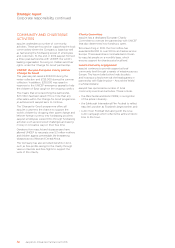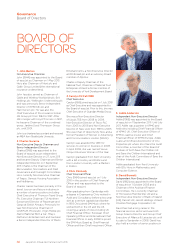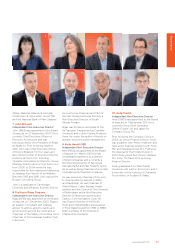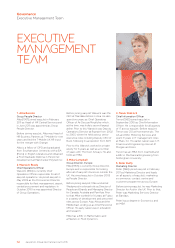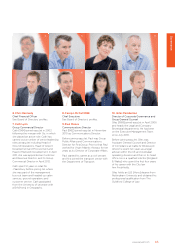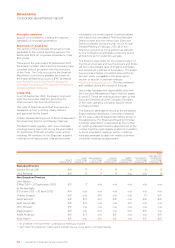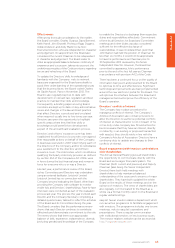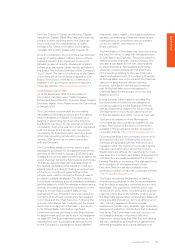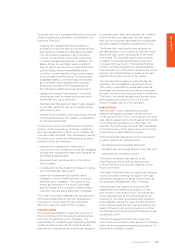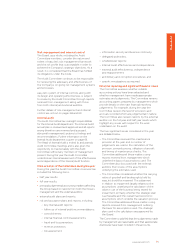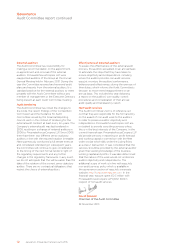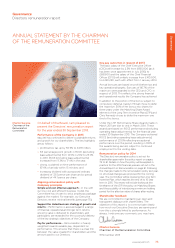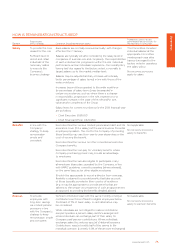EasyJet 2013 Annual Report Download - page 68
Download and view the complete annual report
Please find page 68 of the 2013 EasyJet annual report below. You can navigate through the pages in the report by either clicking on the pages listed below, or by using the keyword search tool below to find specific information within the annual report.easyJet plc Annual report and accounts 2013
66
Governance
Corporate governance report continued
During the course of the year the Chief Executive
and Chief Financial Officer have both met with
representatives of easyGroup Holdings Limited, the
Company’s largest shareholder, to discuss relevant
matters. The Chief Financial Officer has also met
separately with representatives of easyGroup IP
Licensing Limited (an affiliate of easyGroup Holdings
Limited) to discuss matters relating to the
management and protection of the easyJet and
‘easy’ brands.
Board Committees
Audit Committee
The Audit Committee comprises three independent
Non-Executive Directors. As at 30 September 2013,
the Audit Committee members were David Bennett
(Chairman), Keith Hamill and Adèle Anderson. David
Bennett has served as the Chairman of the
Committee throughout the year. The Committee
members have been selected to provide the wide
range of financial and commercial expertise
necessary to fulfil the Committee’s duties. David
Bennett was previously an Executive Director of
Abbey National plc, and prior to that the Group
Chief Executive and Group Finance Director of
Alliance & Leicester plc. Keith Hamill has had
considerable experience as a Director of listed
companies and was Finance Director of WHSmith,
Forte and United Distillers and a partner in Price
Waterhouse (from 1986 to 1988). Adèle Anderson
was a partner in KPMG until July 2011 and held roles
including Chief Financial Officer of KPMG UK, Chief
Executive Officer of KPMG’s captive insurer and
Chief Financial Officer of KPMG Europe. Adèle
currently chairs the Audit Committee of Intu
Properties plc. The Board considers each Committee
member’s financial experience to be recent and
relevant for the purposes of the Code. This
Committee meets at least three times per year
and, during the year ended 30 September 2013
the Committee met three times.
The terms of reference of the Audit Committee are
documented and agreed by the Board. The full text
of the terms of reference is available in the
governance section of easyJet’s corporate website,
http://corporate.easyJet.com.
The Audit Committee report is set out on pages
70 to 72.
Remuneration Committee
As at 30 September 2013, the Remuneration
Committee comprised four independent Non-
Executive Directors: Charles Gurassa (Chairman),
David Bennett, Professor Rigas Doganis and Andy
Martin. This Committee, which meets at least twice
per year, is responsible for making recommendations
to the Board concerning the compensation of senior
executives. It also determines, within agreed terms
of reference, the specific remuneration packages for
each of the Executive Directors and the Chairman,
as well as the level and structure of remuneration
for senior management. New Bridge Street (NBS)
(an AON Hewitt Company) has been appointed as
easyJet’s remuneration consultants. NBS are a
member of the Remuneration Consultants Group
and comply with its code of conduct. A sister
company in the AON Hewitt Group also conducted
employee surveys for the Company; other than this,
NBS has no other connection with the Company.
The Remuneration Committee has met four times
during the year.
Shareholders are required to approve all new
Long Term Incentive Plans and significant changes
to existing plans. Further details of these plans, as
well as the activities undertaken by the Committee
during the year, can be found in the Directors’
remuneration report as set out on pages 73 to 88.
The full text of the terms of reference for the
Remuneration Committee is available in the
governance section of easyJet’s corporate website,
http://corporate.easyJet.com.
Finance Committee
The Finance Committee comprises three
independent Non-Executive Directors. As at
30 September 2013, the Finance Committee
members were David Bennett (Chairman), Adèle
Anderson and Andy Martin. This Committee meets
at least twice a year; this year it met five times. The
primary function of the Finance Committee is to
review and monitor the Company’s treasury policies
and activities. Examples of matters considered by
the Committee during the year include liquidity
metrics, aircraft financing and currency hedging.
The terms of reference of the Finance Committee
are documented and agreed by the Board. The full
text of the terms of reference is available in the
governance section of easyJet’s corporate website,
http://corporate.easyJet.com.
Safety Committee
The Safety Committee was set up in January 2013
to consider matters relating to the operational safety
of the Group. The Committee comprises two
independent Non-Executive Directors, and one
independent safety expert. As at 30 September
2013, the Safety Committee members were
Professor Rigas Doganis (Chairman), Keith Hamill
and Geoff Want (independent safety expert). The
Committee meets at least three times a year; this
year it met four times. The primary function of the
Safety Committee is to assess the Company’s
oversight of safety systems, processes, operations
and resources, and to review and monitor the
implementation of the Company’s annual safety
plan. The Committee also examines specific safety
issues as requested by the Board. Where
appropriate, the Committee reviews relevant reports
published by the UK Air Accident Investigation
Branch (AAIB), major incidents that have affected
other operators, and other external reports on
matters relevant to safety and security. As was the
case prior to the establishment of this Committee,
the Board continues to review and assess safety
through monthly independent safety reports


